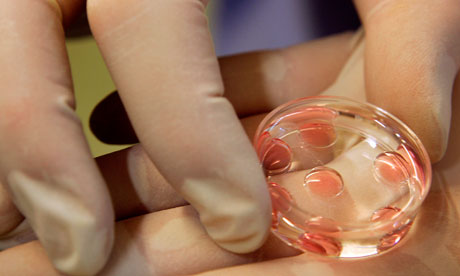
What's the cost of conception? If you pick a lucky number, just 20 quid. Britain's first fertility lottery, with £20 tickets giving would-be parents the chance of winning £25,000 worth of fertility treatment, has been launched by the To Hatch charity. The tabloids are taking a high moral stance, quoting critics who condemn the gamble as "demeaning to the nature of human reproduction".
But what's demeaning is the desperate measures people with fertility problems have to take to become a parent. When the story broke, the number of hits on the website for To Hatch, the organisation behind the "Win a Baby" game, caused it to crash.
The media hate assisted motherhood. Women who simply want a little help to have a baby are portrayed as unnatural, evil and downright selfish. Earlier this week, the Daily Mail headlined on two women who'd had IVF treatment – one single, one Nigerian – who were "milking the NHS". In the next column, it was joyfully revealed that Kate Middleton hoped to have a baby. Ironically, rearing a royal costs the taxpayer millions. But that's a bill we seem to be prepared to pay.
When the budget for breeding is drawn up, it's always assisted conception that's highlighted as the most dispensable. As health costs are cut, fewer health authorities are offering free cycles; others are imposing more restrictions on who's entitled to receive them. Infertile women aren't deemed worthy of public money. Even multiple birth organisations distinguish between deserving and undeserving parents. One emailed asking if anyone could donate a triple buggy to a new mother of three "conceived naturally", implying she was worthy of such charity. If she'd had IVF triplets, it would just be her fault.
Yet the IVF price tag is a pittance in the total public bill for raising a child. It costs the state an average of £126,000 for one child's education alone. If a scan in pregnancy reveals a foetus has half a heart, the NHS quite rightly uses all its resources to try to make that baby better. The cost of an IVF cycle is insignificant in comparison, around £5,000 – a tiny percentage of the overall parenting price tag.
The anti-IVF preachers' sums just don't add up. For this leave-it-to-nature lobby ignores wider economic factors. By definition, an IVF baby is desperately wanted. A baby carefully conceived after much planning in a Petri dish is perhaps less likely to draw on social welfare than one casually brought about accidentally. So if cost is the main consideration, all babies should be brought into being through assisted conception acronyms – IVF (in vitro fertilisation), ICSI (intracytoplasmic sperm injection), and PGD (pre-implantation genetic diagnosis) among them. That way the overall pull on the public purse would be considerably reduced.
This may be a eugenicist's dream. It isn't mine. But by accusing assisted-conception parents of costing too much and denying them NHS support, you're deciding who's fit to have a family. You're saying if you're under 39, married and fertile, then it's perfectly acceptable for you to have your Chloe and Jack, even if they're twins. But if you're a little bit older, single and have a condition that makes conceiving a challenge, then you should not have babies.
The flawed economic argument against IVF is just a screen behind which those opposed to oddball families can conveniently hide. What those who decry assisted conception really don't like is stroppy, single or middle-aged women having babies. Like me.

